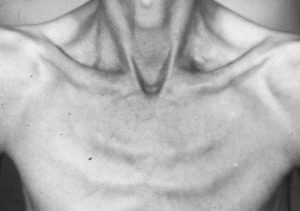Cancer Awareness: Disordered Eating Behaviors During Cancer Treatment
 September is National Blood Cancer Awareness Month, National Ovarian Cancer Awareness Month, Prostate Cancer Awareness Month and Childhood Cancer Awareness Month – and there is a connection between cancer and eating disorder habits that cancer patients, family and friends may not be aware of.
September is National Blood Cancer Awareness Month, National Ovarian Cancer Awareness Month, Prostate Cancer Awareness Month and Childhood Cancer Awareness Month – and there is a connection between cancer and eating disorder habits that cancer patients, family and friends may not be aware of.
Cachexia, which is also known as the “wasting disorder,” is a problem that many cancer patients face.
What Is Cachexia?
Cachexia is characterized by weight loss, the loss of muscle tone and other anorexia-like symptoms in people with cancer. This disorder can also affect and compromise a patient’s fat tissue and skeletal muscle. In most cases cachexia begins after a person has been diagnosed with cancer.
However, sometimes a patient can go in to see a doctor and report cachexia symptoms, and then be diagnosed with cancer. Most doctors report signs of cachexia in patients who have been in remission, but learn that the cancer has returned. It can also develop in patients whose cancers are not responding to treatments like chemotherapy.
What Causes Cachexia?
It is important to understand that although cachexia shares a lot in common with anorexia, it is actually a physical response of the body, rather than emotional response of the person. Cachexia is one of the ways that the body reacts to the growth of a malignant tumor somewhere in the body. There are two different ways which cachexia manifests itself in a person.
In some cases, patients may continue to eat normally, but the body will simply refuse to utilize the nutrients that a person is ingesting. Other cancer patients experience a loss of appetite due to their illness, and the body develops cachexia as a result. However, if a person begins to deliberately restrict food, even if the person is suffering from cancer, this is still considered to be anorexia.
Researchers do not typically consider anorexia to be the primary cause of the wasting disorder. Cachexia is connected to the patient’s metabolism and tissue catabolism. When a patient has cancer, the synthesis of proteins decreases, and the abasement of proteins increase. This makes the body unable to properly metabolize the nutrients that it is provided with. Patients may lose as much as 20 percent of their body weight when suffering from cachexia.
Cachexia Treatment
Unfortunately, there is no specific treatment for cachexia, and the only way to manage it is to control the cancer. Patients suffering from cachexia who begin to respond to conventional cancer treatments, such as radiation, will eventually see the symptoms of cachexia diminish. Doctors advise against increasing calorie intake because weight gain will generally be too minimal and will only affect fat tissues, not the muscles.
The combination of weight gain and increased muscle tone is the only way to combat the wasting disorder. Occasionally, doctors recommend the use of corticosteroids, which increase a patient’s appetite and which can also improve a patient’s mood. Although this does not alleviate cachexia, it has been known to make a noticeable difference in some patients.
In some cases, doctors work with nutritionists to determine what type of foods a patient with cachexia should be eating as well. It is important to know about conditions such as cachexia, and its relationship to eating disorders so that we may better help our loved ones struggling with cancer.
Source: Mesothelioma.com
 Eating Disorder Self Test. Take the EAT-26 self test to see if you might have eating disorder symptoms that might require professional evaluation. All answers are confidential.
Eating Disorder Self Test. Take the EAT-26 self test to see if you might have eating disorder symptoms that might require professional evaluation. All answers are confidential.